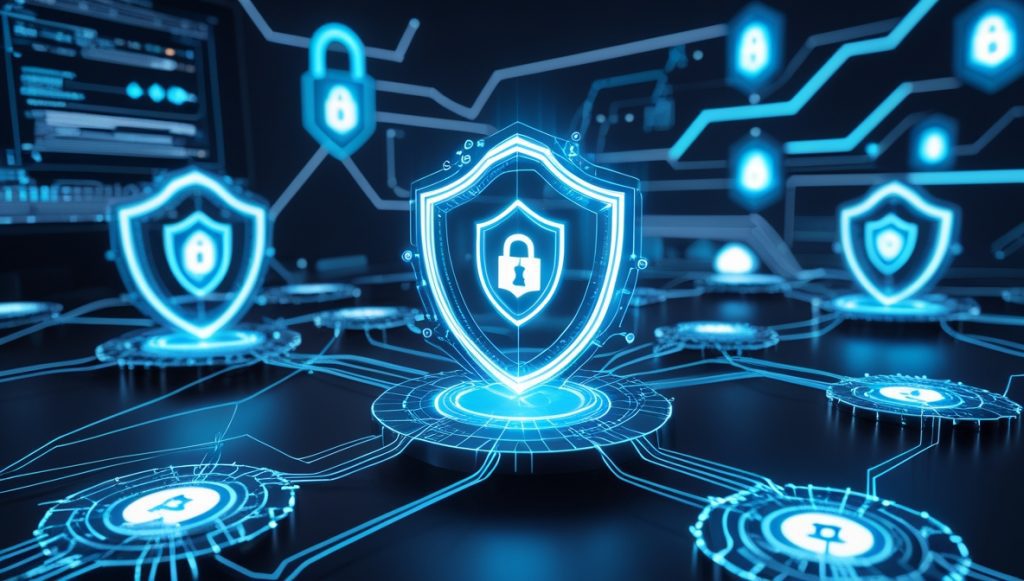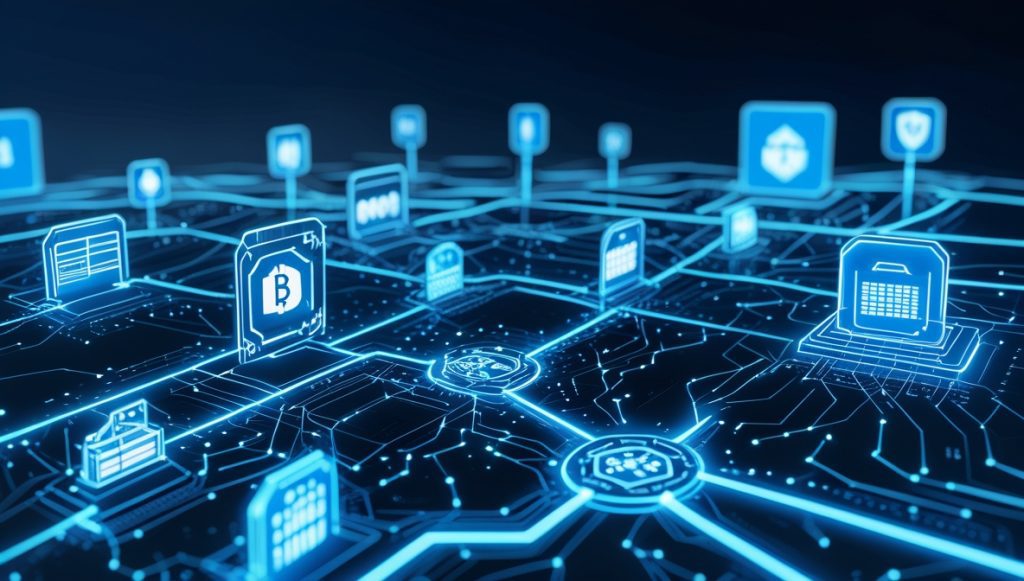Blockchain and Data Security are becoming critical topics as industries continue to face increasing cyber threats. Blockchain technology transforms security measures because existing methods poorly defend against sensitive data breaches. Blockchain technology presents an innovative data security standard to different business sectors through its decentralized system which preserves integrity while maintaining transparency. This paper discusses the security improvements blockchain delivers to data systems its industrial uses and its projected disruptive evolution in technology.
How Blockchain Enhances Data Security

Blockchain security transformation occurs through its decentralized transparent tamper-proof system for handling digital data. Data security models using traditional systems based on centralized databases become less effective because blockchain technology spreads data across many nodes which creates resilience against breaches along with preventing single system failures.
Transaction records exist permanently in an immutable database which hackers find it almost impossible to modify or change stored data. Digital platforms achieve maximum privacy and security through cryptographic encryption methods which allow authorized users to access sensitive information.
Decentralization and Transparency
The core feature of blockchain technology functions through its distributed operating format to remove dependence on particular centering organizations. Since traditional databases hold their data at one physical location attacks can successfully target these systems. A blockchain system distributes data across multiple network nodes which decreases the possibility of data hacking and tampering.
The fundamental element of blockchain security relies on transparency. All blockchain transactions receive timestamps that establish links between current and previous transactions. Every member of the network shares identical database information so it becomes virtually impractical for anyone to modify previous records unless all participants actively agree. Data integrity remains intact while responsibility is guaranteed through this system.
Immutability and Data Integrity
Blockchain operates on the principle of immutability, meaning once data is recorded, it cannot be changed or deleted. This is achieved through cryptographic hashing and consensus mechanisms. Each block contains a hash of the previous block, creating a secure chain of data.
Immutability ensures that once information is stored, it remains verifiable and unalterable, making blockchain ideal for securing critical records such as financial transactions, medical histories, and legal contracts. This significantly reduces the risk of fraud and unauthorized modifications.
Smart Contracts for Automated Security
Smart contracts are self-executing agreements embedded into the blockchain, designed to automate and enforce security protocols. These digital contracts execute actions based on predefined conditions without requiring intermediaries.
By leveraging smart contracts, businesses can ensure secure transactions, enforce compliance, and eliminate human errors. This not only enhances efficiency but also minimizes the risk of security breaches caused by manual processes.
Applications of Blockchain in Data Security Across Industries

Blockchain is making a profound impact on data security in various industries by providing advanced protection mechanisms against cyber threats. In finance, it strengthens fraud detection and secures transactions through decentralized ledgers. The healthcare sector benefits from blockchain’s ability to safeguard patient records and prevent unauthorized access to sensitive medical data.
In supply chain management, blockchain ensures transparency and authenticity, reducing risks of counterfeiting and fraud. Government institutions leverage blockchain for securing voting systems, identity management, and public records, ensuring data integrity and trust. By implementing blockchain technology, industries can create more secure and resilient data protection frameworks.
Financial Industry
Blockchain has revolutionized financial security by reducing fraud and enhancing transaction transparency. Traditional banking systems are prone to cyber threats, but blockchain ensures secure, tamper-proof transactions.
Financial institutions use blockchain to implement secure payment processing, fraud detection, and regulatory compliance. With decentralized ledgers, transactions are recorded in real time, reducing the risk of unauthorized access and fraudulent activities.
Healthcare Sector
The healthcare industry needs to prioritize security because it manages numerous sensitive patient data records. The healthcare industry achieves private medical data storage alongside protected record modifications through blockchain technology.
Through blockchain integration healthcare providers together with hospitals can easily exchange patient data safely and retain complete system integrity. Through blockchain patients achieve control over their medical records to limit access to only permitted healthcare staff.
Supply Chain Management
The extensive number of participants in supply chain networks introduces high risks of unauthorized breaches and counterfeits. Supply chains become more secure through blockchain technology because it provides complete visibility throughout the supply network.
Businesses implement blockchain tracking solutions to validate product origins and track packages live and stop fraudulent activities. Because counterfeit products represent major threats to pharmaceuticals as well as luxury goods this technology is very effective.
The Future of Blockchain in Data Security

Paid blockchain deployment for data protection will experience rapid adoption because cyber threats are continuously evolving. Research about the technology expects builders to combine artificial intelligence (AI) with blockchain to develop autonomous security protocols which automatically detect threats live while performing autonomous threat mitigation. Progressive encryption systems combined with zero-knowledge proof models will preserve data secrecy at all times without compromising operational visibility.
The implementation of decentralized identity systems will enable users to manage their data better which leads to decreased dependence on central database systems that are repeatedly breached. Organizations will understand blockchain better because it protects sensitive digital data which will become more necessary for secure transactions throughout the upcoming years.
AI and Blockchain Integration
AI together with blockchain technology will boost data protection through automatic threat recognition and data forecast abilities. Real-time transaction analysis performed by AI-driven algorithms helps detect unusual activities which AI uses to stop cyber attacks from worsening. The combined systems will create automated security protocols which adjust their defenses according to new security threats that emerge.
Quantum-Resistant Blockchain
Traditional encryption systems become vulnerable because quantum computing advances in the present era. Blockchain developers search for quantum-resistant cryptographic algorithms to ensure future security of blockchain architecture.
The quantum-resistant system of blockchain defends data from being compromised even when quantum computers gain an excessive amount of computational power. The maintenance of digital asset integrity requires this approach for upcoming years.
Regulatory and Industry Adoption
When authorities realize the value of blockchain they are planning to implement standardized systems which secure data. To satisfy consumer trust along with current data protection regulation requirements several industries need to pick up blockchain-based security protocols.
Governments work to deploy blockchain technology for enhancing digital identity protection along with combating fraud and simplifying official processes. Widespread implementation of blockchain systems will guarantee its permanent place as the main infrastructure for data protection.
Conclusion
Blockchain and Future of Data Security are inseparable as industries move towards more secure and transparent digital ecosystems. The data storage platform and protection system blockchain implements new fundamental changes in the way financial services and healthcare and supply chain management handle their data sharing processes. The future standards of security will improve through blockchain integration with AI and quantum-resistant cryptography as technological evolution continues. Organizations adopting blockchain solutions in present times will obtain superior preparedness to address potential data security requirements in upcoming years.

